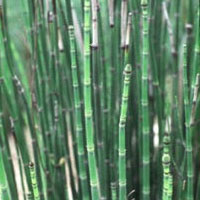Horsetail
 © Steven Foster
© Steven FosterParts Used & Where Grown
Horsetail is widely distributed throughout the temperate climate zones of the Northern Hemisphere, including Asia, North America, and Europe.1 Horsetail is a unique plant with two distinctive types of stems. One variety of stem grows early in spring and looks like asparagus, except for its brown color and spore-containing cones on top. The mature form of the herb, appearing in summer, has branched, thin, green, sterile stems and looks like a feathery tail.
- Reliable and relatively consistent scientific data showing a substantial health benefit.
- Contradictory, insufficient, or preliminary studies suggesting a health benefit or minimal health benefit.
- For an herb, supported by traditional use but minimal or no scientific evidence. For a supplement, little scientific support.
Our proprietary “Star-Rating” system was developed to help you easily understand the amount of scientific support behind each supplement in relation to a specific health condition. While there is no way to predict whether a vitamin, mineral, or herb will successfully treat or prevent associated health conditions, our unique ratings tell you how well these supplements are understood by the medical community, and whether studies have found them to be effective for other people.
For over a decade, our team has combed through thousands of research articles published in reputable journals. To help you make educated decisions, and to better understand controversial or confusing supplements, our medical experts have digested the science into these three easy-to-follow ratings. We hope this provides you with a helpful resource to make informed decisions towards your health and well-being.
This supplement has been used in connection with the following health conditions:
| Used for | Amount | Why |
|---|---|---|
Brittle Nails | Refer to label instructions | Anecdotal reports suggest that horsetail may help treat brittle nails, possibly due to its high content of silicic acid and silicates. |
Edema | Refer to label instructions | Horsetail has a diuretic action that accounts for its traditional use in reducing mild edema. |
Osteoarthritis | Refer to label instructions | Horsetail has anti-arthritis actions and is rich in silicon, a trace mineral that plays a role in making and maintaining connective tissue. |
Osteoporosis | Refer to label instructions | Horsetail is a rich source of silicon, and preliminary research suggests that this trace mineral may help maintain bone mass. |
Urinary Tract Infection | Refer to label instructions | Horsetail may relieve UTI symptoms by increasing urinary volume and helping to flush bacteria out of the urinary tract. |
Wound Healing | Refer to label instructions | Horsetail can be used both internally and topically to decrease inflammation and promote wound healing. |
Traditional Use (May Not Be Supported by Scientific Studies)
Reportedly first recommended by the Roman physician Galen, several cultures have employed horsetail as a folk remedy for kidney and bladder troubles, arthritis, bleeding ulcers, and tuberculosis. In addition, the topical use of horsetail was used traditionally to stop the bleeding of wounds and promote rapid healing. The use of this herb as an abrasive cleanser to scour pots or shave wood illustrates the origin of horsetail’s common names—scouring rush and shave grass.2
Copyright © 2026 TraceGains, Inc. All rights reserved.
Learn more about TraceGains, the company.
The information presented by TraceGains is for informational purposes only. It is based on scientific studies (human, animal, or in vitro), clinical experience, or traditional usage as cited in each article. The results reported may not necessarily occur in all individuals. Self-treatment is not recommended for life-threatening conditions that require medical treatment under a doctor's care. For many of the conditions discussed, treatment with prescription or over the counter medication is also available. Consult your doctor, practitioner, and/or pharmacist for any health problem and before using any supplements or before making any changes in prescribed medications. Information expires December 2026.
